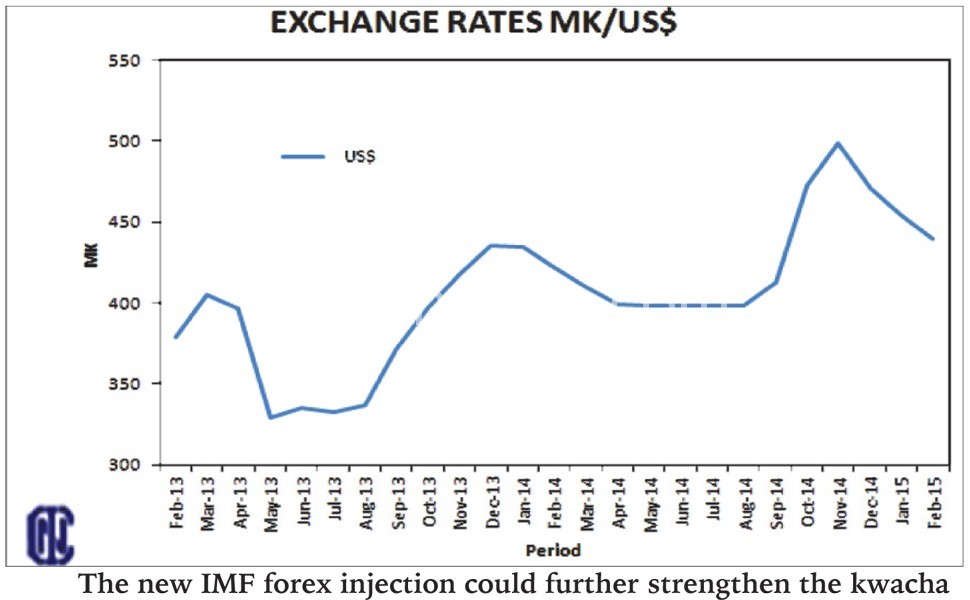IMF nod: The good, the bad
- Mejn says positive review refreshing
- Gondwe does not expect the country’s bilateral donors to resume budgetary support
- IMF on Monday approved disbursement of $18.1 million (about K7.4 billion)
—————————————–
The IMF’s high marks for Malawi’s economic programme may signal a crawling return to donors’ good books, but even the top purse keeper does not believe the development will suddenly unlock the frozen budget support.
 Minister of Finance, Economic Planning and Development Goodall Gondwe said yesterday he does not expect the country’s bilateral donors to resume budgetary support following positive reviews from the International Monetary Fund (IMF) on Monday.
Minister of Finance, Economic Planning and Development Goodall Gondwe said yesterday he does not expect the country’s bilateral donors to resume budgetary support following positive reviews from the International Monetary Fund (IMF) on Monday.
Sounding less optimistic on budget support, especially from bilateral development partners, Gondwe said that is the case because most donor capitals have changed their approach to helping Malawi.
Said Gondwe: “Budgetary support will not be resumed in the wake of this development because bilateral donors have since changed their policy in the way they will be providing their support.”
The IMF Executive Board meeting on Monday approved disbursement of $18.1 million (about K7.4 billion) and an extension of the current Extended Credit Facility (ECF) arrangement by six months to May 22 2016.
Traditionally, positive IMF reviews have in the past acted as endorsements of the country’s economic programme and a signal that it is safe for donors to entrust government with their money. But of late, the IMF’s word is no longer enough.
Malawi’s donors suspended budget support in the last quarter of 2013 following the plunder of public resources at Capital Hill dubbed Cashgate.
The donors’ move froze at least $150 million (around K65 billion) that most development partners would rather redirect away from Capital Hill control and, instead, use other aid modalities such as pooled funding, project support and rechannelling to non-governmental organisations (NGOs).

But while this may have kept the donor resources within Malawi, actual disbursements have been hard to trace and capturing its impact in the economy even harder.
Also in doubt is the likelihood that the scattered resources would achieve harmonised implementation of programmes and projects towards the goals of the national development plan, the Malawi Growth and Development Strategy (MGDS).
Since the Cashgate climax in 2013, various IMF missions have viewed implementation of meaningful PFM reforms to be crucial in supporting the macroeconomic policy stance and boosting private sector confidence, according to investment and business advisory firm Nico Asset Managers. Other donors have taken the same stance.
In return, Capital Hill has consistently reiterated its commitment to strengthen public financial management (PFM) systems and to be guided by the gaps identified in the Baker Tilly forensic audit report. Based on the IMF assessment, government has so far lived up to its commitment.
Donors traditionally support 40 percent of the country’s recurrent budget and 80 percent of the development account.
In a separate interview yesterday, Treasury spokesperson Nations Msowoya still hoped that the extension of the ECF would trigger some donors such as the African Development Bank (AfDB) to resume budgetary support.
Said Msowoya: “The African Development Bank will start concluding talks on budgetary support estimated at K8 billion. Others such as the World Bank and European Union [EU] may start planning their budgetary support decisions soon. But on the bilateral donors, there is no indication yet.”
The death of the Common Approach to Budgetary Support (Cabs), which coordinated donor responses and tried to harmonise results frameworks, makes it harder for donors to reach common positions.
In his reaction, Malawi Economic Justice Network (Mejn) executive director Dalitso Kubalasa described the IMF statement as “refreshing”.
But he warned that it would not “force” every other development partner to follow suit “since they all have their own due diligence and frameworks for processing and making such decisions independently.”
Said Kubalasa: “Nonetheless, this might still have the net effect of pitching Malawi in a more positive light at the international level with a push for the government momentum and real action in earnest to institute the necessary reforms and redress over the eroded trust and confidence.”
The $18 million from IMF is expected to improve the balance of payment position of the Reserve Bank of Malawi (RBM) and will further shore up the kwacha, which has strengthened in recent months.
In a statement on the completion of the fifth and sixth reviews of Malawi’s economic performance, IMF acting chairperson and deputy managing director Mitsuhiro Furusawa said addressing weaknesses in PFM system was necessary to restoring donor confidence.
Meanwhile, President Peter Mutharika will on April 2 meet senior civil servants on a strategy for deepening PFM in the wake of the IMF decision.





